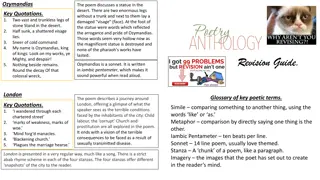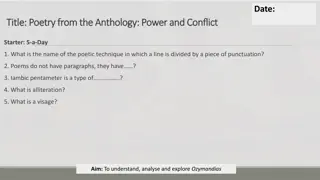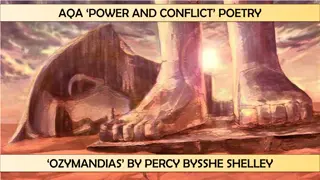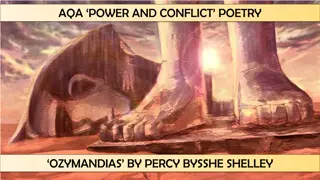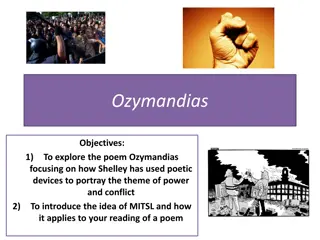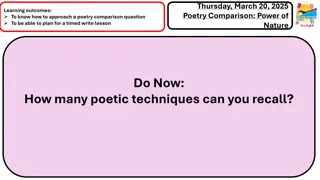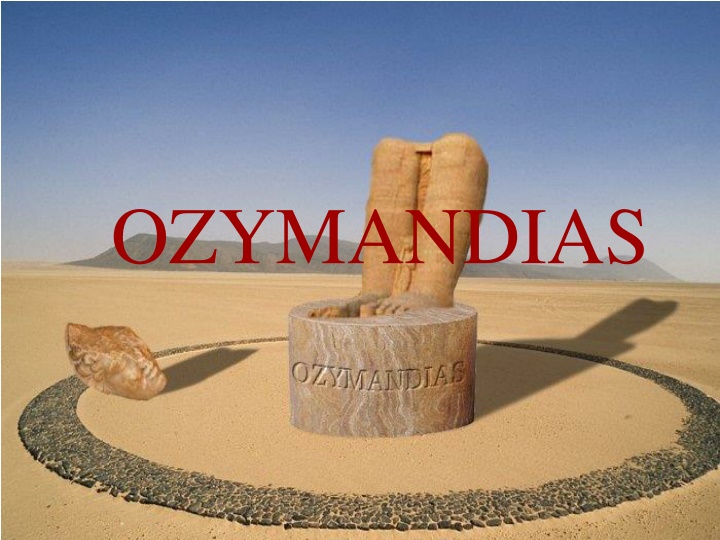
Poem Analysis: Ozymandias by P.B. Shelley - Summary & Context
"Explore the poignant poem 'Ozymandias' by P.B. Shelley, which reflects on the transient nature of power and fame through the broken statue of the once mighty King Ozymandias in the Egyptian desert. Learn about the poet's background, the historical context, and the mesmerizing narrative within the poem."
Download Presentation

Please find below an Image/Link to download the presentation.
The content on the website is provided AS IS for your information and personal use only. It may not be sold, licensed, or shared on other websites without obtaining consent from the author. If you encounter any issues during the download, it is possible that the publisher has removed the file from their server.
You are allowed to download the files provided on this website for personal or commercial use, subject to the condition that they are used lawfully. All files are the property of their respective owners.
The content on the website is provided AS IS for your information and personal use only. It may not be sold, licensed, or shared on other websites without obtaining consent from the author.
E N D
Presentation Transcript
INTRODUCTION Ozymandias is one of the greatest poems of the renowned poet P.B. Shelley. Ozymandias was a mighty and famous king of Egypt. He got his own statue built. The poet came to know through a traveller that Ozymandias statue was seen by him in a broken condition. His trunk less statue stands lonely in the desert. Under the statue are inscribes the words : My name is Ozymandias, King of Kings . Thus, in this poem the poet brings out the vanity of human pomp and power. Everything in this world is subject to decay. The name and fame of mighty and powerful human beings is short lived. Time may be a great healer, but it is also a merciless destroyer.
About the Poet The son of a Rich Tory Squire, Percy Bysshe Shelley was educated at Eton and then send to Oxford. Shelley came under the influence of revolutionary ideas of the English philosopher, William Godwin, whose daughter, Mary Godwin he ultimately married. In 1818, Shelley left for Italy; he drowned in the Bay of Spezia in 1822. .
Romantic Poet First published in 1818 the weekly journal (The Examiner) later in his collection Rosalind and Helen (1819) Source of the Poem Greek historian Diodorus Siculus wrote about a massive Egyptian statute. Iambic Pentameter Octave & Sestet- Narrative poem Story within a story Shelley wrote this poem in competition with his friend Horace Smith.
Ozymandias -By P.B.Shelley
I met a traveller from an antique land Who said: Two vast and trunkless legs of stone Stand in the desert. Near them, on the sand, Half sunk, a shattered visage lies, whose frown, And wrinkled lip, and sneer of cold command, Tell that its sculptor well those passions read Which yet survive, stamped on these lifeless things, The hand that mocked them, and the heart that fed; And on the pedestal these words appear: "My name is Ozymandias, king of kings: Look upon my works, ye Mighty, and despair!" Nothing beside remains. Round the decay Of that colossal wreck, boundless and bare The lone and level sands stretch far away.
Summary of the Poem Once the poet met a traveler from the ancient land of Egypt. He told the poet the story of an Egyptian king named Ozymandias. The traveler told him that he had seen two huge legs of stone standing in the desert of Egypt. The legs were trunk less. A shattered visage lay by the side of these huge legs. It lay half-buried in the sand. It had a frown on its brow. It had wrinkled lips. It had a sneering look. There was an expression of cold command in its eyes. These things stamped on the visage showed that the sculptor had understood the king s passions on stone had died, but his art was still alive.
Similarly, the king whose heart fed those cruel passions on stone had died, but the signs of his cruelty could still be seen. The poet means to suggest that a man dies but his actions outlive him. The following words were written on the pedestal of the statue : My name is Ozymandias, King of Kings : Look upon my works, ye! Mighty, and despair! The traveller told the poet that now nothing remained of that proud king. No trace of his power was left on the sands of time. There was nothing but sand round the decay of that huge statue. It lay all in ruins. Round it the lone, level and barren sands of the desert stretch far away.
Transience(temporary) of human life Ephemeral(lasting for short time) nature of human power & fragility of human existence Explores the fate of history and the ravages of time. Greatest empires Impermanent, legacy faded Power, human everything is temporary Nothing can stand or withstand for time Great message about short-lived, existence of mighty ruler.

